Chapters in Georgia Native Plant Society
History
Over two decades ago, the Georgia Native Plant Society was founded by people based in metro Atlanta. Since that time, their initiative and message around the importance of native plants to our lives and the ability of individuals to make a difference locally in their protection, stewardship, rescue and propagation, has spread across Georgia and in fact across the USA. Today our members are served in other locations across the state where local groups are providing educational information, restoration opportunities and opportunities to learn more.
Realignment
In November 2019, GNPS adopted new bylaws, which implemented a state-wide governing board to set organizational policy, define its strategic vision, and directly support chapter activities. This new organizational structure paved the way for more chapters to form throughout Georgia.
Join a chapter
There are currently 8 chapters of the Georgia Native Plant Society. As a member of GNPS you too can get to work and join like minded people in your area by aligning yourself with one of our chapters.
For current members, login and update your chapter affiliation through the chapter affiliation form. For new or renewing members, select your chapter affiliation on the membership form.
Form a chapter
Let us know if you are interested in learning more about how to join or start up a local chapter near you in the state of Georgia by using the Contact Us form. Current members can also use the Chapter Interest Form. To learn more about the overall process, view the Chapter Quick Start Guide. For a more in-depth guide to forming and running a chapter, see the Chapter Manual.
News & Events
Report of Mary Scott Nature Park Workday February 5, 2022
Report of Mary Scott Nature Park Workday February 5, 2022 On February 5,2022, 34 volunteers worked to remove nonnative plants and trash from Mary Scott Nature Park. Earning service hours were 8 high school students from the Interact Club at Chamblee High, 14 from the National Honor Society at Lakeside High, and 6 from Greater Atlanta Christian School. Among the weeds that were pulled were English ivy, Japanese honeysuckle, Nandina, Youngia japonica, cherry laurel, Chinese holly, Japanese holly, dandelion, and chickweed. The next scheduled workday will be Saturday, March 5, 2022, 2-4 pm, when we plan to continue removing nonnative plants from the park. Please bring your gardening gloves, soil knife/trowel, and kneeler to help us improve the park for birds and insects.
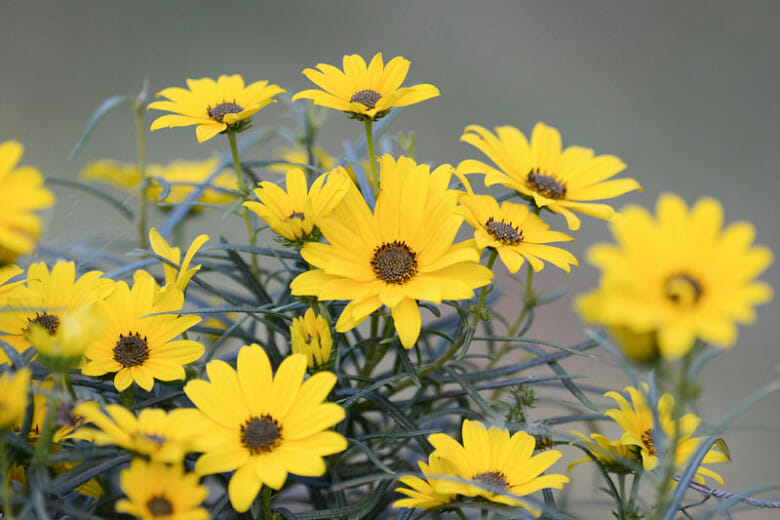
Mark your calendars!
Since the success of our chapter’s inaugural event, the April Native Habitat Tour, our Intown Atlanta Chapter of GNPS has been hard at work fine-tuning our calendar of events for the rest of the year. Mark your calendar for this all-star native plant line-up:
- On Saturday, June 25 from 10 a.m. – 2 p.m., you can find GNPS Intown in Downtown Decatur tabling at the National Pollinator Week Festival. A variety of exhibitors will be on hand, including Beech Hollow Wildflower Farm, Monarchs Across Georgia, Metro Atlanta Beekeepers Association, Wylde Center, Georgia Audubon Society, Decatur Cares About Climate, DeKalb County Master Gardener Extension Volunteers, Scott Park Community Garden, and more. Come see us at the Festival.
- On Sunday, June 26 from 3 p.m. – 5 p.m. join GNPS Intown as we partner with Trees Atlanta for a panel discussion called Adding Native Plants to Your Intown Landscape. We’ll discuss practical ways to make your property more habitat friendly using native plants. The event will be hosted at Trees Atlanta’s Kendeda Center at 225 Chester Avenue. Look for an email later this week with more details. Information will also be posted on the GNPS website and social media.
- On Saturday, August 20 11 a.m. – 1 p.m., participants of all ages are invited to bring a lunch and join our chapter at select intown parks for a Native Plant Pollinator Picnic as we learn how to be a citizen scientist, identify high habitat value native plants, and participate in the Great Georgia Pollinator Census. We are striving for four parks located in each corner of Intown Atlanta so that our membership has a variety of options to choose from.
- On Sunday, September 18 10 a.m. – noon join GNPS Intown members for our Annual Chapter Meeting where the main event after the meeting will be an epic Native Plant Swap for newbie and seasoned native plant gardeners to share, learn, and talk plants. Like 2021, we are aiming for a great outdoor location in a beloved neighborhood greenspace.
- On Sunday, November 13, our Programming & Education Committee will host a membership-wide planning meeting to help set our 2023 events calendar. Bring your great ideas and can-do spirit to this meeting. We’ll also have a way for you to provide suggestions online if you cannot join.
- In early January 2023 our native plant sharing continues with our first Winter Sowing Workshop and Native Plant Seed Swap which will offer an opportunity for participants to swap native seeds and learn an easy way to propagate them.
Want to help execute one or more of the aforementioned events? Please email intown@gnps.org and indicate your willingness to help with our Programming & Education Committee. Chairs Laura Markson and Grace Manning will get you plugged in.
Want to get involved in a different way? Great. Keep reading. Intown Atlanta has five committees for our chapter, each working to advance an aspect of native plant awareness and action.
- Programming & Education – Co-Chaired by Laura Markson & Grace Manning, this committee is responsible for our signature chapter-wide events in a given year. If you enjoy event planning, bringing big ideas to life, and showcasing native plants in unique ways, this committee is for you.
- Restoration – Chaired by Suzy Nicksic, Restoration is focused on supporting existing GNPS-certified restoration sites in the Intown Atlanta area and recruiting new sites and and teaching everyday citizens restoration principles.
- Advocacy – The Advocacy committee will meet for the first time on Wednesday, June 22 at 5:30 p.m. on Zoom. Here is the link to the Zoom meeting. We are seeking nominations for chair. To nominate someone (including yourself) or to express your interest in this committee, please complete the form linked here. Advocacy will encourage local policy changes to support native wildlife habitats.
- Communications – Chaired by Baker Owens, Communications spreads the important word about native plants, our ecoregion, and ways to learn more about going native. If you like to write, take photographs of your garden, or are skilled in marketing, this committee is for you.
- Native Habitat Certification – Co-Chaired by Sharon Worsham and Rita Growler, this committee will education on, and expand the adoption of, habitat certification for public and private properties alike in the Intown Atlanta area.
If any of these committees interest you, please email intown@gnps.org and we’ll get you connected.
Check your email and follow us on Facebook and Instagram for more updates.
Finally, read this great article by fellow Intown Atlanta GNPS member, Amy Aidman.
Native Garden Installations
Our chapter has been actively supporting efforts to encourage the planting of natives in public places. We have completed two native garden installations and are planning for a third location later this year. We’re very excited to share pictures of our current projects.
Mineral Bluff Depot – Planted beds are identified with both common and scientific names. Weekly maintenance by chapter members, Teryn and Larry Romaine give visitors at the Ride the Rails public events educational exposure to using native plants in landscapes.
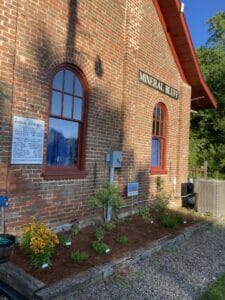 .
. 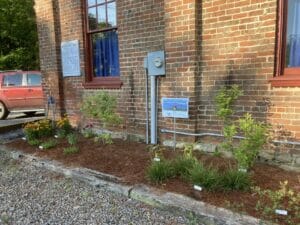 .
. 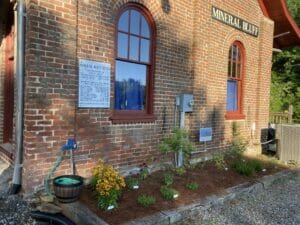
Meeks Park – Our beds were planted in Mid-May and are located down the main road into the large parking lot. Our beds are to either side of the opening to park. We are also being asked to plant an island near the Union County Parks and Recreation Building.
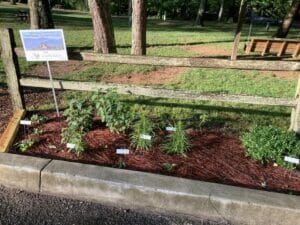
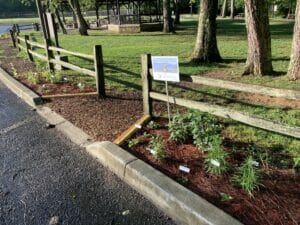
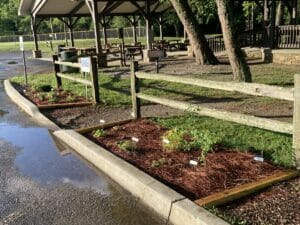 .
. 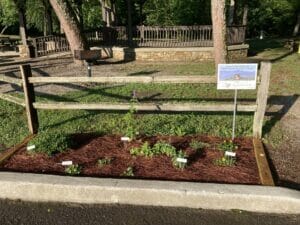
Our May Chapter Meeting with Kathryn Litton
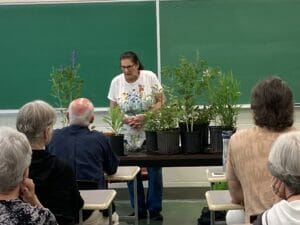
With record attendance at our May chapter meeting, Kathryn Litton presented on how to use native plants for landscaping.
Kathryn Litton, local landscaper and noted area native expert has created native cultivars and specializes in programs on Native installation for the garden. Litton is well-known in our state and served as the liaison between the Garden Club of Georgia and the State Department of Transportation. Her early experience selling her own natives was not well received initially, so she set about educating homeowners about what they can use in their gardens. Litton has completed several landscaping efforts at public buildings, state and local parks. She brought several plants to show us: amsonia, false blue indigo, dwarf crested iris, lobelia, turtlehead, monarda, boneset, etc. General Supply in Blairsville sells some of the plants she propagates. She is the author of Here Come the Natives booklet available in local bookstores. She answered many questions, offered practical advice, and gave away the plants as door prizes.

Native plant habitat tour
Photo credit: Leslie Inman
Article by Amelia Aidman
Something beautiful is happening in Atlanta. More and more Atlantans are embracing a new vision of gardening that encourages nurturing plants native to the local environment. Ideas are spreading like wildflowers and, among other groups and initiatives, the newly formed Intown Atlanta chapter of the Georgia Native Plant Society (GNPS) is helping this growing trend bloom.
On Saturday, April 2, the chapter held its first public event with an inaugural annual Native Plant Tour.
Native azaleas in blazing colors, a scarlet buckeye in full flower, blueberry bushes with still tiny berries, enormous trillium, an old growth forest with some of the tallest trees in the area and a natural waterfall, innovative hardscaping created by a can-do attitude with resources that might otherwise be seen as yard waste–these were all among the delights taken in on the tour. Six sites in the Druid Hills and Decatur areas were included in the tour—2 nature centers and 4 homes on private land. More than 300 people participated.
Animated conversations among the visitors and native habitat gardeners made for an excited buzz. The atmosphere was one of friendly feelings and an air of community with visitors running into friends and acquaintances. People shared information and new acquaintances were formed.
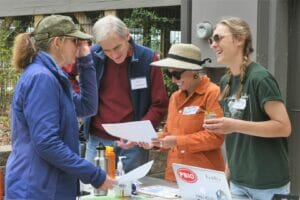
Photo credit: Laura Markson
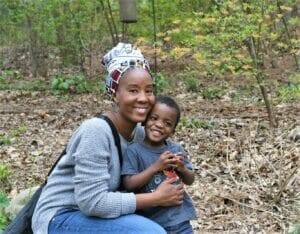
Photo credit: Laura Markson
Barefoot in her garden, as she often is, Virginia Dupre, one of the homeowners and an accomplished gardener, called the mood one of “curiosity, appreciation, awe and wonder.” Visitors expressed gratefulness for her garden’s beauty, her knowledge and her work over decades to create her garden. Fallen leaves on her property are used in her yard–gently raked into the plant beds. Since beneficial pollinator insects overwinter in the leaves, she is careful not to chop them up or otherwise disturb what is living and reproducing in them. If she doesn’t have enough of her own leaves, she will use the leaves of neighbors who otherwise leave them out for county curbside pickup.
Leaving the leaves is a common practice among those who are gardening with natives. In lieu of a yard of manicured lawn they create native habitats featuring mostly, or all, indigenous plants. Those going in that direction find little need for the noisy and toxic landscaping practices in use by much of the lawn care industry. Aside from the benefit to the urban environment by not polluting with heavy machinery and not adding to peace-destroying noise, native habitat gardening feeds pollinating insects, including butterflies, as well as birds.
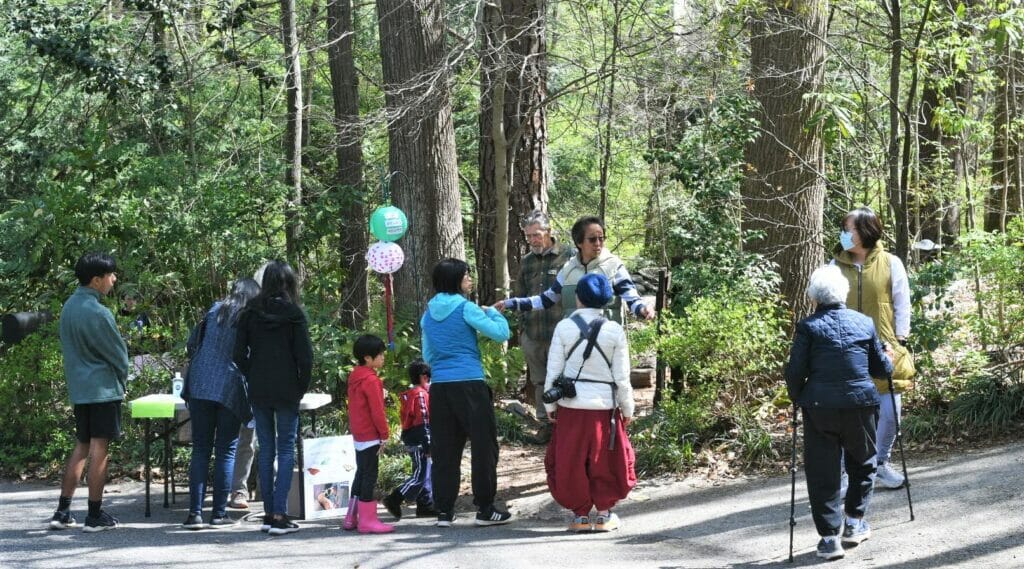
Photo credit: Laura Markson
Walking through the Decatur neighborhood from the Wylde Woods at Oakhurst Garden to the nearby Pardue residence, looking at the yards along the way, there was a sense that many in the neighborhood have been influenced by the presence of that center, which educates about plants and environmental issues. Many of the houses had kept fallen leaves, using them instead of commercial mulch, and had plants that are indigenous to the region growing in their yards. They were not lawn-centric. It is as though the ethos of Wylde Woods at Oakhurst Garden radiates out into the neighborhood raising awareness of these issues.
Alex Dileo, the 28-year-old Board Chair of the new Intown chapter of the Georgia Native Plant Society (GNPS), said that the event’s organizers are motivated by a shifting paradigm that resists and eschews the hegemony of the green grass lawn in favor of a model of planting that feeds pollinators, soil, and people. She was spurred to switch from a grass lawn to plant natives after participating in GNPS native plant rescue events, and says that after just two years “I see bees buzzing, fireflies, and birds nesting in my trees”. She lives in the southwest Atlanta Oakland City neighborhood and her home’s lot is small, but she encourages even those who have access to more limited spaces such as a balcony or window boxes to grow native plants, saying that they will notice changes.
For those of us trying to support a cleaner, healthier local environment, the tour was exciting, affirming and imbued us with hope. We know that the stakes are high if the current ways of tending lawns remain dominant. We also recognize that we can’t assume that government entities and related corporations will enact the needed changes without a groundswell movement created by people who care deeply about these issues.
The native plant habitat tour gave us a day of “positivity” according to organizing committee member, Leslie Inman. It was a day to learn, a day to teach, a day to be inspired and to feel that we are a part of something bigger; to know that we are adding a piece to the puzzle in how to evolve from non-sustainable practices to those that nurture the earth and ourselves. The nature centers and homegrown yards in this first annual native garden habitat tour are the evolving result of years of loving care that is bearing fruit.
Future native garden habitat tours across the Atlanta area are on the group’s agenda. The plan is to highlight gardens in different seasons, as well as varied eco-systems and habitats. Atlanta’s new GNPS chapter aims to involve and connect with both seasoned native plant gardeners, those who are newly interested and just getting started in their rewilding quests, as well as those anywhere else along the path. Kudos to the energetic organizing committee that did such a wonderful job of spearheading this inaugural event!
To inquire about joining the Georgia Native Plant Society, send an email message to intown@gnps.org or link to the “Become a Member” page on the GNPS website: https://gnps.org/get-involved/become-member/.
Amy Aidman, Ph.D., is an expert in the area of children and media research. She is Emeritus faculty of Emory University’s Department of Film and Media where she developed and taught classes on children and media and other media-related topics and was the Director of the Media Studies degree programs. She currently serves as Board of Directors Chair for Kids Video Connection. Amy is also an Intown Atlanta chapter GNPS member and is avidly learning about environmentally friendly gardening practices, she is reshaping her own garden to encourage pollinators.


